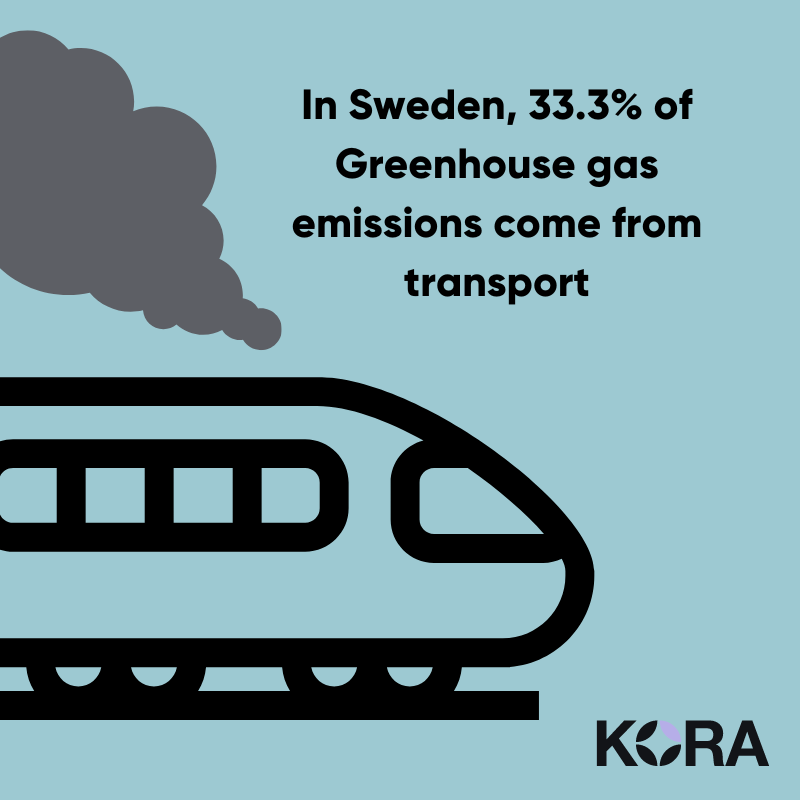Scandinavia is renowned worldwide for innovation, be it the agricultural and engineering feats of Denmark, or the quality-of-life and healthcare marvels of Norway. Matters in Sweden are no different, with the land of the midnight sun certainly leading the way in transport sustainability. This isn’t simply reserved for the bustling capital city of Stockholm, with measures rolled out nationwide, and plenty of incentives introduced by local councils, garnering much success and acclaim.
Even with world-leading transport innovation in place, some still choose to travel via car, or utilise other fuel intensive vehicles – but what if there was some sort of incentive in place for employees? At KORA, we’re looking to rectify matters, one reward at a time. Let us take you through some of the most notable public transport sustainability measures to hit headlines in Sweden over the past few years – let’s get to it!
An Important Cause
Headline-grabbing for a very good reason, climate change is one of the major challenges of our time, and 2024 could mark a defining moment as we strive for a sustainable society. Everything from shifting weather patterns to rising sea levels are a sign of the times, and the impacts of climate change are global – not just restricted to particularly warm or cold climates. Without drastic action today, adapting to these impacts in the future will be more difficult and costly, taking effect in the lifetimes of our next generation.
Already in the Western world we are facing storms, floods, droughts and wildfires, so unless we take action to reduce emissions by becoming less reliant on fossil fuels, matters will only worsen. The advantages of a more sustainable society? As well as promoting an overall better quality of life, due to more active lifestyles, cleaner air and improved water quality, we could significantly reduce rates of hospitalisation, illness, and mortality. This is just one example.
Existing Measures
Existing measures are in place throughout the country to reduce emissions, with transport a huge contributor to the carbon footprint of any society. In 2024, leading Swedish researchers, car companies, and digital organisations are collaborating to develop smart transport systems – which we’ll cover in detail below:
Automobile Alternatives
There’s no avoiding the fact that the automotive industry in Sweden is strategically and economically important. Accounting for approximately 15 percent of the nation’s total exports, the automotive sector also employs around 155,000 people, many of whom are having to adjust to the environmentally conscious society.
Progress is accelerating in an effort to achieve goals of future sustainable success, with common forms of transport including efficient and sustainable rideshare vehicles, trams and trains – alongside schemes to provide more electric bicycles and scooters for shorter journeys. With plenty of initiatives going on behind the scenes, not to mention widespread transport sustainability incentives such as KORA, there’s never been a better time to prioritise your carbon footprint when commuting.
Trusting In Renewables
Despite the positive changes being made, and seemingly on the horizon, the transport sector is facing enormous challenges on a global level, while fuel prices continue to steadily rise, encouraging drivers to seek other means of getting from A to B. The need for sustainable modes of transport is becoming increasingly critical in urban areas all over the world, and major cities such as Malmö, Gothenburg and Helsingborg are embracing such incentives.
Trusting in renewables, The Forum For Innovation In The Transport Sector exists as a unique platform, comprising the leading transport companies in Sweden, and collaborating to develop sustainable transport systems and push forward for even more innovation. Since numerous public sector and private organisations have been working to develop together, new transport solutions have emerged, spawning new innovative businesses and industrial developments. If proof of anything, this suggests that collaboration and joint effort is the way forward.
Serving Stockholm
Public transport within capital cities is usually a highly organised operation, requiring adequate funding, lots of planning, and unfortunately in most cases, an array of environmentally harmful processes and vehicles introduced. Despite the task at hand, trains and buses in Stockholm have been breaking the mould, using 100% renewable energy since 2017 – with assurances that the city aims to provide the most sustainable public transport in the world.
At the time of writing, the Stockholm public transport system consists of around 450 bus lines, three shuttle boat lines and a metro system covering a total of 100 kilometres, with the majority of Stockholm Line properties, depots and stations heated using green energy. New construction work is subject to strict recycling and eco-labelling requirements too, with the governing bodies working hard to make all services quieter and minimising emissions as well as noise pollution.

The Future Of Transport
Though there are plenty of positive developments being made to cut harmful transport and replace existing measures with eco-friendly alternatives, the fact remains that transportation is responsible for one-third of Sweden’s overall emissions of greenhouse gases It has been decided across the board that by 2045 at the latest, Sweden must have no net emission of greenhouse gases entering the atmosphere, and after 2045, emissions must be negative – with the nation binding or capturing more greenhouse gases from the atmosphere than are being emitted.
What does the future hold? Well, practical measures are likely to yield the most positive changes, allowing individuals to adopt behaviours into everyday life and stick to them, instead of rolling out drastic projects with little tangible benefit. EVs provide the greatest opportunity for improving vehicle efficiency and decarbonizing mobility, by replacing fuel with renewable sources. Further developing the infrastructure for biking should also produce results.

Employee Incentives
From a commercial perspective, one way to encourage employees is introducing quality incentives. KORA software can automate the measurement of employee commutes, providing scientifically derived measurements. The benefits of utilising our platform don’t stop there either, as reducing emissions can boost a business’ reputation, decrease staff turnover, attract new customers, and cut costs
KORA provides accurate and verifiable emission tracking, and our commitment involves assisting businesses in measuring and reducing their Scope 3 emissions through the incentivization of employees – using KORA tokens. Gamifying the process by issuing redeemable KORA tokens means that whether you manage a small organisation or act as sustainability officer for a large company, all bases are covered.
Kora Sustainability: Your Personal Carbon Reduction Plan
Choosing to take public transport or cycle to work is of course just a tiny part of the job, with plenty of seemingly insignificant actions contributing to your own personal journey of reducing carbon emissions and ultimately, trimming down your carbon footprint. Everyone has their own personal journey to take concerning sustainable choices, and we truly believe that if you help make the planet greener, you deserve to be recognised, empowered and rewarded.
Sustainable initiatives almost always begin with reducing carbon emissions, and at KORA Sustainability, we possess all the tools you require to get your emission tracking in order. Allowing you to automate the measurement of your employees’ commuting, and promote carbon emission reduction through incentives. Providing a deeper understanding of carbon emissions and helping people to take responsibility for our collective impact on the planet, we’re able to collectively work towards a worthy shared goal! Join us on our journey, and introduce incentives to your workforce today by enquiring and booking a demo.




